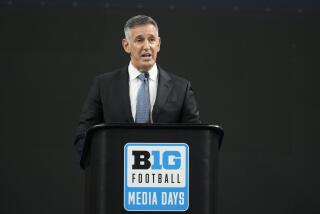Pac-12 slows the college football expansion train for now
- Share via
Don’t mess with … Pullman?
These are fascinating days for purveyors of dark comedy and comeuppance.
Last year, Texas wrecked what was then the Pacific 10 Conference’s plan to expand to 16 teams when the Longhorns reneged in the 11th hour.
Tuesday night, as college football stood at the precipice of upheaval, the West told Texas, “go east” and sang the old Texas song: “You’ve got to know when to hold ‘em, know when to fold ‘em.”
This wasn’t the Cuban missile crisis by the factor of infinity, but it’s been an interesting “Ten Days in September” for brinkmanship.
It is simplistic to suggest Pac-12 presidents acted heroically when they rebuffed Texas and Oklahoma and their two political appendages.
“If the Pac-12 was able to structure terms that were favorable terms for the membership, they would have done it,” Western Athletic Conference Commissioner Karl Benson observed Wednesday.
That the decision turned out to be good for college football was a residual benefit.
There were scenarios in which the league would have expanded to 16 and other conferences may have crumbled, but it’s OK to think Pac-12 university presidents were also magnanimous.
To be clear: Commissioner Larry Scott did meet with Texas and Oklahoma. A deal could have been done if not for some audacious other-end behavior.
The message, as one Bowl Championship Series executive familiar with the situation relayed it this week, was “Texas cannot be trusted.”
The Pac-12 was willing to consider expansion again, but not on anyone else’s terms.
The audacious part was Oklahoma and Texas acting as if it was their decisions to join the Pac-12, not the other way around.
With the Big 12 reeling after the defections of Nebraska, Colorado and Texas A&M, Oklahoma and Texas used the Pac-12 as a lever in negotiations. Oklahoma President David Boren, a former United States senator, threw down the oratory gantlet earlier this month when he pronounced the Sooners would not “be a wallflower.”
Boren made it sound as if his school had an open invitation to the Pac-12. And, of course, Oklahoma State was welcomed to tag along. Boren told the Oklahoman newspaper only days ago that the Pac-12 was his school’s “sole focus.”
If only he had booked a reservation. This is the same Boren who, in 2006, demanded Oregon’s controversial win over Oklahoma in Eugene be expunged from the record books because of shoddy Pac-10 officiating.
Texas also erred in thinking just being Texas trumped everything.
Commissioner Scott met with Texas to see whether something special could be carved out. But there was a huge problem — the Longhorn Network. Texas, in conjunction with ESPN, launched its own network weeks ago. It was controversial from the start and ultimately drove Texas A&M to the Southeastern Conference.
Texas Inc. thought it could transfer operations to its Pacific branch. However, the Pac-12 had just made equal revenue sharing a cornerstone of its new $3-billion network deal.
Many in the league were appalled to read details of Texas’ Pac-12 entry application in Sunday’s Austin American-Statesman. The newspaper suggested a way Texas could join the Pac-12 while retaining the revenue from the Longhorn Network. The story had the financial breakdown and even the 16-team pod system that would make it all work.
The reaction out west: When Bevo Flies.
Last year’s push toward a super 16 conference was rubber-stamped because Scott wanted the strongest package he could muster as he entered television negotiations.
By just adding two teams, though, the Pac-12 secured the most lucrative contract in college football. University presidents were thrilled beyond words.
So why did they need to go to 16 teams now?
Taking in Texas, Oklahoma, Oklahoma State and Texas Tech would have required swallowing hard on academics. Texas is the only one of the four that is a member of the Association of American Universities (AAU), but also the school that presented the Pac-12 the most headaches.
Not expanding allows the Pac-12 to take credit for slowing the frenetic and cannibalistic pace of expansion. Syracuse basketball Coach Jim Boeheim, speaking at the Monday Morning Quarterback Club in Birmingham, said, “If conference commissioners were the founding fathers of this country, we would have Guatemala, Uruguay and Argentina in the United States.”
Maybe the backlash had some immediate impact on some presidents. And maybe it’s only temporary. “I don’t expect this is going to be the end in terms of realignment,” Benson said.
Benson hopes the Pac-12 staying pat at least leads to an in-season moratorium. “It would be nice to get back to the football season and focus on the teams, student-athletes and the tradition of college football on Saturdays,” he said.
In the 1990s, Benson oversaw the 16-team WAC before it dismantled and splintered. “I lost eight schools in one phone call,” he said of the eight football-playing schools who broke away to form the Mountain West.
Boise State, his alma mater, ditched the WAC this year for the Mountain West. Three other WAC schools — Fresno State, Nevada and Hawaii — will join the Mountain West for football next year.
Nevada and Fresno State announced they were leaving while Benson was moving his daughter into her dorm at USC.
“I took it very personally,” he said. “I felt I was betrayed.”
Benson has reached out in recent days to beleaguered colleagues Dan Beebe of the Big 12 and John Marinatto of the Big East.
“There is survival,” Benson said he told them. “As many times as people counted the WAC out, and people told me to just shut it down, you can rebuild it.”
Celebrate today’s walk back from the ledge.
Enjoy this relative expansion calm — for the week or two that it lasts.
More to Read
Go beyond the scoreboard
Get the latest on L.A.'s teams in the daily Sports Report newsletter.
You may occasionally receive promotional content from the Los Angeles Times.











